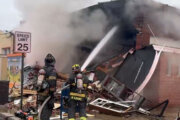This year’s hurricane season shocked many, as storm after storm hit U.S. soil and caused insurmountable damage to homes, land and commercial property.
While the recent devastation in Florida and the southern Appalachians was extensive, it isn’t the end of storm destruction on U.S. soil. The repeated weather hits have put a spotlight on the continued efforts by cities, residents, nonprofit organizations and the Federal Emergency Management Agency to help affected areas recover.
But the hurricanes’ destruction doesn’t stop at the immediate problems residents faced as they returned to their homes. The damage continues as the real estate industry in affected areas came to a screeching halt and still see delays, long-term damage and the possibility of a lasting stigma toward the properties and places that underwent the worst damage.
Storm damage takes a toll on individual real estate transactions and the larger market, and plays a role in determining the housing market’s future success.
— The impact of Hurricane Helene and Hurricane Milton
— What happens to real estate contracts?
— Housing markets take a hit.
— Looking back: Katrina
— Expectations going forward
[How to Prepare and Repair a Home Before and After a Hurricane or Major Storm]
The Impact of Hurricane Helene and Hurricane Milton
Hurricane Helene made landfall in the Big Bend area of the Florida Gulf Coast on Sept. 26, rated a Category 4 hurricane. Helene moved north and brought severe flooding across the southern Appalachians — resulting in hundreds of deaths and billions in property damage, according to the National Weather Service. Strong winds of up to 60 mph also damaged property and blew down trees and power lines along the Gulf Coast and into the North Carolina mountains.
On Oct. 9, Hurricane Milton struck near Siesta Key at 8:30 p.m. as a Category 3 hurricane. The National Weather Service reported that Milton’s wind field expanded as it approached the Florida Peninsula, which extended its impact further from the storm’s center. East Florida also experienced at least seven confirmed tornadoes and hurricane-force wind gusts that downed trees and power lines and damaged homes and businesses. On the northern side of the storm, total rainfall amounted to up to 15 inches of rain and higher, leading to localized flooding and rises of nearby creeks and rivers.
“The hurricanes have caused major disruption in their respective markets for the time being,” says Dottie Herman, a part-time Florida resident and vice chair and former CEO of Douglas Elliman Real Estate. “However, I believe in the long view that buyers will, at some point, return to those areas.”
Due to the volatile property insurance market and both storms’ significant damage, Herman predicts that property values and local housing markets will be further impacted.
[What To Do When Your Home Floods]
What Happens to Real Estate Contracts?
For obvious reasons, when the forecast says a hurricane is imminent, you should clear your meeting schedule. For the days the state of Florida and parts of Georgia, South Carolina, North Carolina, Tennessee and Virginia faced heavy rains, high winds and flooding, real estate transactions were put on hold. But once the rain stopped, picking back up wasn’t as easy as running in for a quick closing the next day.
“From a real estate perspective, the impact has varied. Some listings are totally fine and business as usual. Others sustained substantial damage and have been pulled off the market,” says Alec Cantley, real estate broker associate at Premier Sotheby’s International Realty in Asheville, North Carolina.
With a pending transaction at risk, it’s important for any damage to be assessed — and hopefully repaired — as quickly as possible. Buyers and lenders each have valid reasons to be concerned not just for a damaged roof or broken window that occurred during the storm, but the possible mold from moisture that could wait months to reveal itself.
As soon as the storm passes, it becomes the seller and listing agent’s duty to provide immediate updates on the property — as any damage or time it takes to make repairs can further delay the deal. “One of my luxury listings had 12 trees on top of the house. We have pulled the listing while the sellers now work towards a full remodel,” Cantley says.
According to Herman, many real estate contracts include an “Act of God” clause, which allows the parties to delay or terminate the agreement if natural disasters, such as hurricanes or tornadoes, cause unforeseen damage prior to closing.
“Contracts can be delayed anywhere from about a week to a month or so depending on the terms,” says Herman. “During that time, the buyer might want repair work done or renegotiate but if there are extensive delays, either side may opt out of the deal depending on what the contract says.”
Even when there isn’t damage, those updates are necessary to keep the buyer — and by extension, the lender — satisfied that the deal can proceed. Photo evidence that rooms look the same, or notes on problems and a plan for repairs, should be a priority once the hurricane has passed.
The lender can be another story. If a property has been damaged, the investment is at risk, so the lender typically requires a reassessment of the property to determine its worth. A significantly decreased appraisal value due to damage could require the buyer to pay more out of pocket, make seller to agree to lower the sale price or kill the deal.
Housing Markets Take a Hit
While sellers need to be proactive in getting the real estate deal back on track, Cantley noted that many buyers haven’t backed out. They’ve already made a decision to purchase in a part of the world that is prone to tropical storms, so unless the property is no longer livable, a hurricane event likely won’t deter them.
“In the weeks immediately following Helene, I am seeing strong buyer interest for Asheville and the surrounding area,” he says. “Demand seems strong as we move into our peak fall selling season.”
Cantley also added that his office has seen record sales post-Helene, but many pending sales had delayed closings due to utility outages, and some buyers attempted to leverage the storm to renegotiate.
“Confidence in western North Carolina remains very strong,” he says.
However, Herman has seen diminished activity from buyers, especially in flood-prone areas. “Many insurance companies are raising their rates exponentially or refusing to cover properties in high-risk areas. The cost is too burdensome for most homeowners to accept the risk of investment,” she says.
[Can Impact Rated Garage Doors Save Your Home in a Hurricane or Tornado?]
Looking Back: Katrina
It’s hard to assess the devastation from three separate hurricanes this year and not recall past storms that caused excessive damage to homes and took hundreds of lives. Florida still talks about Hurricane Andrew in 1992 and Hurricane Wilma in 2005. Hurricane Sandy wreaked havoc all the way up the Atlantic Coast in 2012, with significant damage to the Jersey Shore.
And, of course, there’s Hurricane Katrina.
Katrina changed New Orleans forever when it struck in August 2005. Katrina and its aftermath claimed more than 1,800 lives and total damage cost nearly $106 billion, according to Encyclopedia Britannica. It wasn’t just the strength of the storm that led to the extensive damage, but a combination of lack of infrastructure to reduce hurricane damage and a delayed FEMA response.
Like with any major storm, home sales came to a screeching halt in New Orleans during the hurricane, but continued to limp for long after the flooding stopped. Real estate technology company HomeLight reveals it took six months to reach roughly the same level of sales prior to Katrina. Even after that, the New Orleans housing market failed to see continued growth for the remainder of 2006.
In the years since, Hurricane Katrina has largely become an unwelcome part of New Orleans’ narrative — homes gutted in the flooding still stand as a scary reminder of what can happen in a hurricane and afterward.
Expectations Going Forward
Any market impacted by a natural disaster will have a recovery period — even if sale levels return quickly, it’s reasonable to expect continued issues with repairs, mold problems in the coming months and additional delays in closing deals.
During this recovery period, Herman says buyers and sellers can expect lengthy delays in closings, repairs and inspections. “Patience is a must as the process can take months with the various renegotiations and reinspection that may need to occur,” she adds.
Cantley says western North Carolina has a long road ahead, but he’s confident in the local market. “The desire of buyers to relocate to the Blue Ridge Mountains remains stronger than ever and I don’t see that changing,” he says. “We will see a lull as we move into winter, which is common for our market regardless, but I expect a strong 2025 selling season especially as we rebuild better than before.”
More from U.S. News
Hurricane Roof Clips: Are They Worth It?
Should You Disclose the Climate Risks to Your Home?
How Climate Change Could Impact Your Home Value
After the Rain: The Lasting Effects of a Hurricane on Home Sales originally appeared on usnews.com
Update 11/08/24: This story was published at an earlier date and has been updated with new information.







